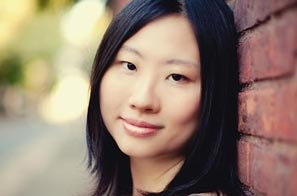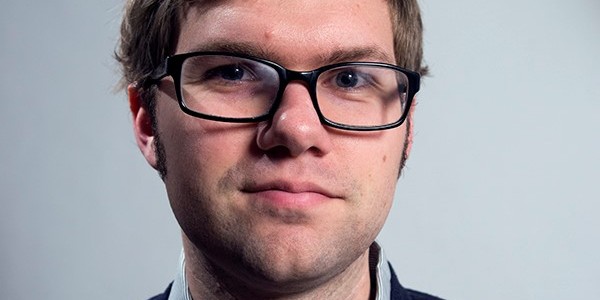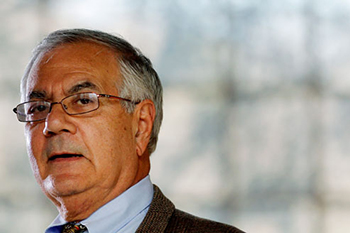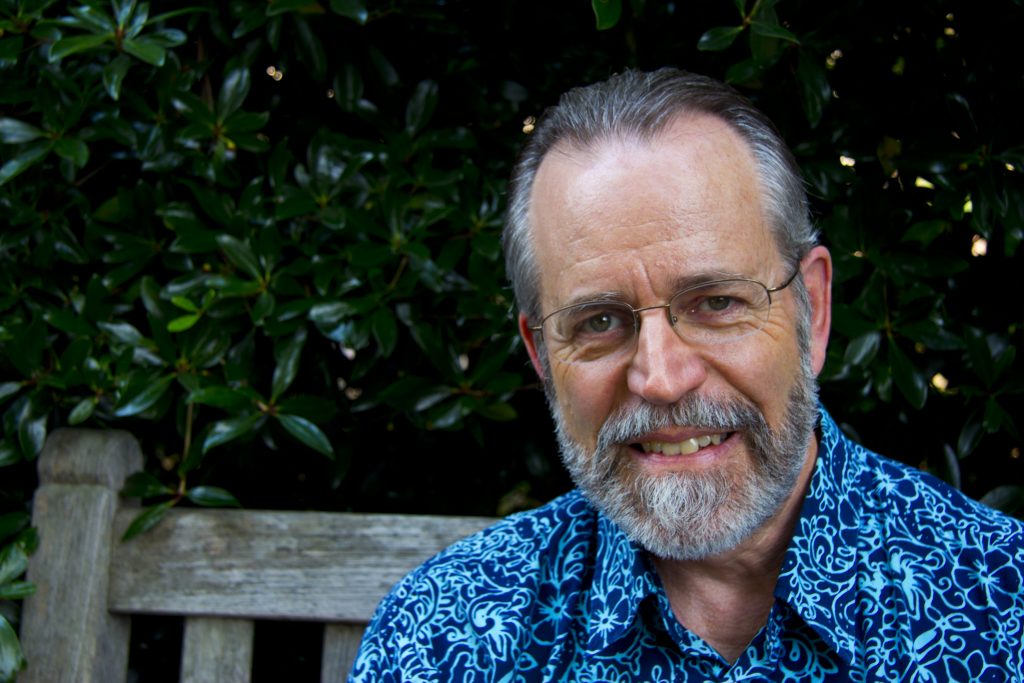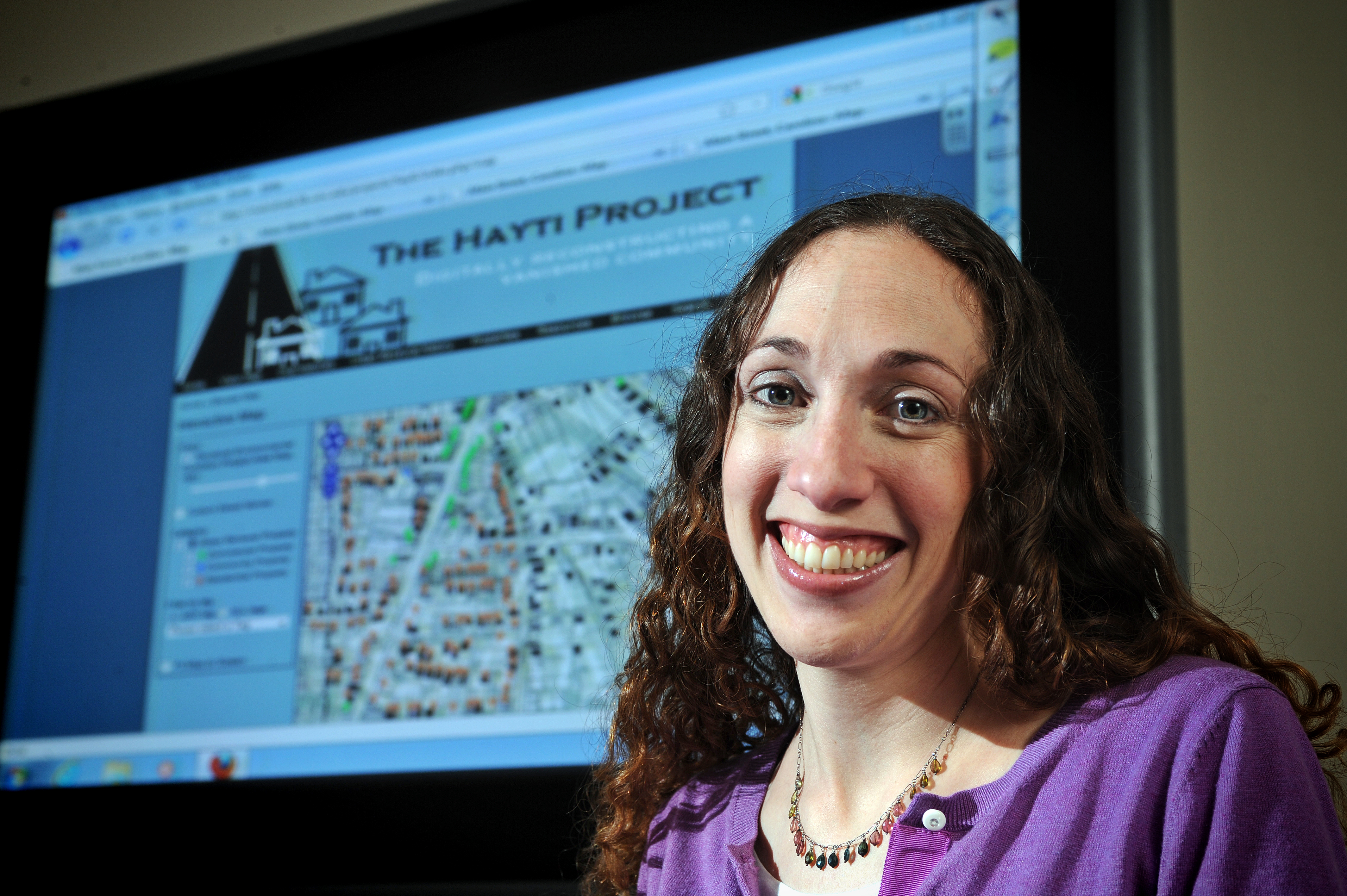
“I am not very good at multitasking,” Pam Lach insists, even as she prepares for her interview by pulling out her laptop and cell phone to await the next ping.
The emails and text messages never stop, and she knows neither can she.
It is 9:30 a.m. on Jan. 24, and the deadline to submit an application for a major digital humanities grant from the National Endowment for the Humanities is at the end of that business day. That’s why team members had been pinging Lach with minor revisions for much of the previous night and into the morning.
As the manager of the Digital Innovation Lab, Lach was called upon to shepherd the grant application. Launched by the College of Arts and Sciences last July, the lab has become a hub of collaboration and interdisciplinary discovery in the use of digital technologies to advance the work of the humanities. (See the recent Gazette story.)
Faculty members and lab co-founders Robert Allen from American Studies and Richard Marciano from the School of Information and Library Science (SILS) said Lach is uniquely qualified to run the lab because of her dual interests in the humanities and digital technologies.
Where is the lab? Ask Allen that question, and he points to Lach’s laptop. “Right there,” he said.
But he could just as easily have pointed to her head.
“Her role with the lab is critical as the person who ‘translates’ between scholars and technologists,” Allen said. “The reason she is able to do that so well is because she has inhabited and understands both worlds.”
Allen first met Lach after she arrived here in 2000 to pursue master’s and doctoral degrees in U.S. cultural history. Allen served on her committee.
It was during the tortuous process of getting money to do needed research for her dissertation – a study of gender performances in post-World War II Hollywood musicals – that Lach became convinced there had to be a better, easier way.
The archive materials she needed were 3,000 miles away in the University of Southern California’s Cinema-Television Library and The Margaret Herrick Library of the Academy of Motion Picture Arts and Sciences.
Even worse, she could not afford to go there on her own, and the research grants that she applied for were repeatedly denied. Prepared to pay her own way, Lach finally secured special funding from the Graduate School to cover an abbreviated research trip.
Her research efforts in Los Angeles proved nearly as difficult as getting there, she said, because digital cameras and portable scanners were not allowed, and the Herrick Library prohibited copies of all unpublished materials and set daily limits on photocopying.
The library at USC was no better, Lach said. Staff refused to make copies of photographs or allow scripts to be reproduced without studio approval because of copyright laws.
After earning her Ph.D. in 2007, Lach took a job as program coordinator at the Carolina Women’s Center, but she never stopping thinking about the difference digitization of source materials would have made to her own research experience.
That nagging question led her eventually to enroll as a master’s student in SILS in fall 2010. It was there that she reconnected with Allen and began working with him on his “Main Street, Carolina” project.
“I enrolled in SILS with the idea of reversing roles,” Lach said. “Rather than be the person struggling to gain access to sources for my research, I could be the person on the other end making access easier as a digital archivist.”
Once she enrolled in courses, Lach began to realize that she could “dream bigger,” by blending the scholarly bent of a historian with the digital know-how of a technologist. That simple idea, she said, is now the driving force behind almost everything she does as the manager for the digital lab.
Lach’s larger lab responsibilities include forging new interdisciplinary connections, developing new projects and managing people and projects in a virtual environment.
“There is a constant flow of email, plus Skyping and employing digital collaboration tools in between face-to-face meetings,” Lach said. “It is sort of like being a doctor on call in that you have to remain available to respond to whatever need arises.”
Folded into these day-to-day duties is Lach’s role as project manager for “Main Street, Carolina,” which involves co-teaching both graduate and undergraduate classes with Allen. The graduate courses primarily pair SILS students with cultural heritage organizations across the state to build digital history projects.
“The students work with the clients to identify resources and to figure out the best way to organize their websites,” Lach said. “By the end of the course, students have worked with the client to deliver an actual product that is actually being used in the community.”
This engagement with non-academic audiences to produce a “public good,” Lach added, is a core principle of the lab that runs as deep as the use of technology.
More recently, Lach has begun working with Marciano to delve into the more technical work of the lab, which is focused on developing tools and processes for handling big historical data.
“I am very lucky that Bobby and Richard invited me to become a part of this lab,” Lach said. “They founded it. They direct it. But they have allowed me to help them imagine what it has yet to become.”
The process, she added, has allowed her to re-imagine expanding possibilities for herself.
Her dream job, she is fairly sure, might not exist yet, but she is not worried. She now knows how to invent it.
–By Gary Moss, University Gazette

